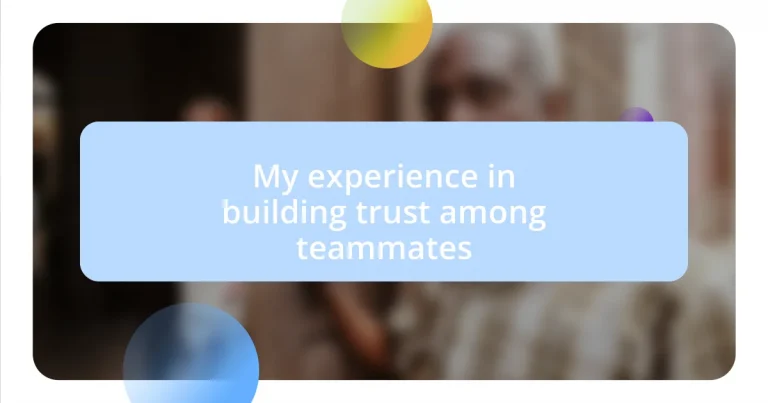Key takeaways:
- Trust is essential for team cohesion, promoting open communication, accountability, and collaboration, which leads to innovation and support during challenges.
- Strategies such as encouraging open communication, setting shared goals, and recognizing achievements are critical in building and maintaining trust among teammates.
- Sustaining trust requires ongoing efforts, acknowledging vulnerabilities, and creating shared experiences that deepen relationships within the team.
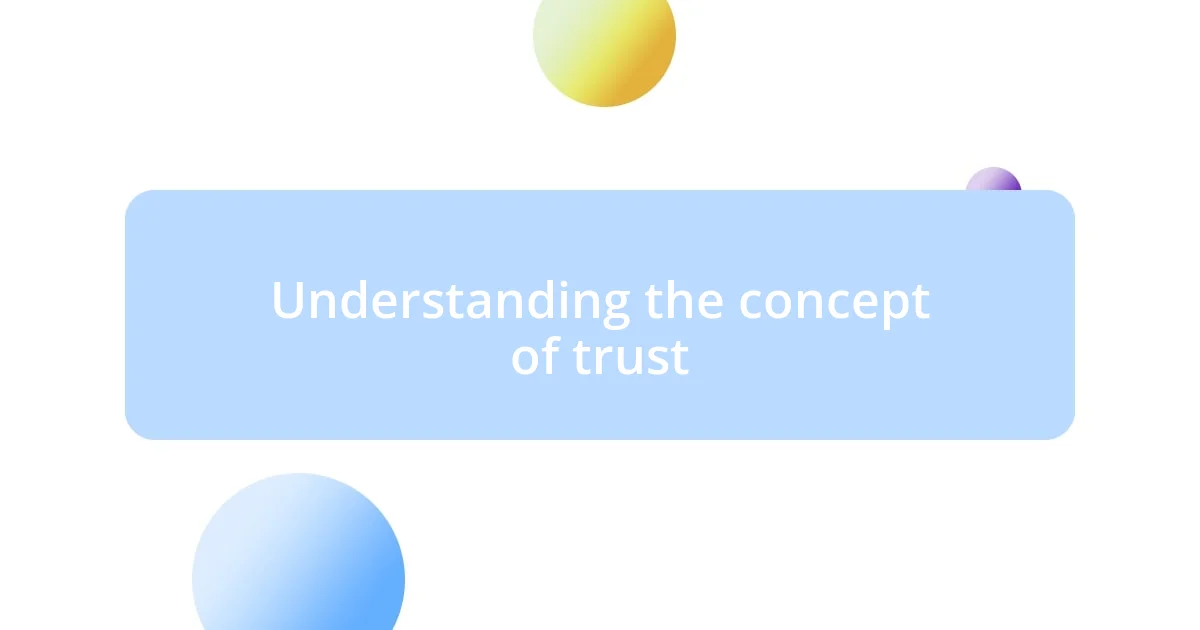
Understanding the concept of trust
Trust is the cornerstone of any effective team. I remember a challenging project where our deadlines were tight, and tension was high. It struck me how our ability to rely on one another transformed the pressure into a supportive environment; when a teammate missed a deadline, we rallied around them instead of pointing fingers.
What does trust look like in a team setting? To me, it’s about feeling safe to express your ideas without fear of judgment. During one brainstorming session, I hesitated to share a bold idea because I wasn’t sure how it would be received. But when a team member encouraged me, I felt that trust deepening, and my contribution ultimately led to a breakthrough.
Reflecting on my journey, I’ve realized that trust isn’t just given; it’s earned through consistent actions and open communication. I recall a time when I took accountability for a mistake that impacted the group. Admitting my fault wasn’t easy, but it created an undeniable bond between us, reinforcing that we could face challenges honestly together. Isn’t that what we all want—a sense of belonging and mutual support?
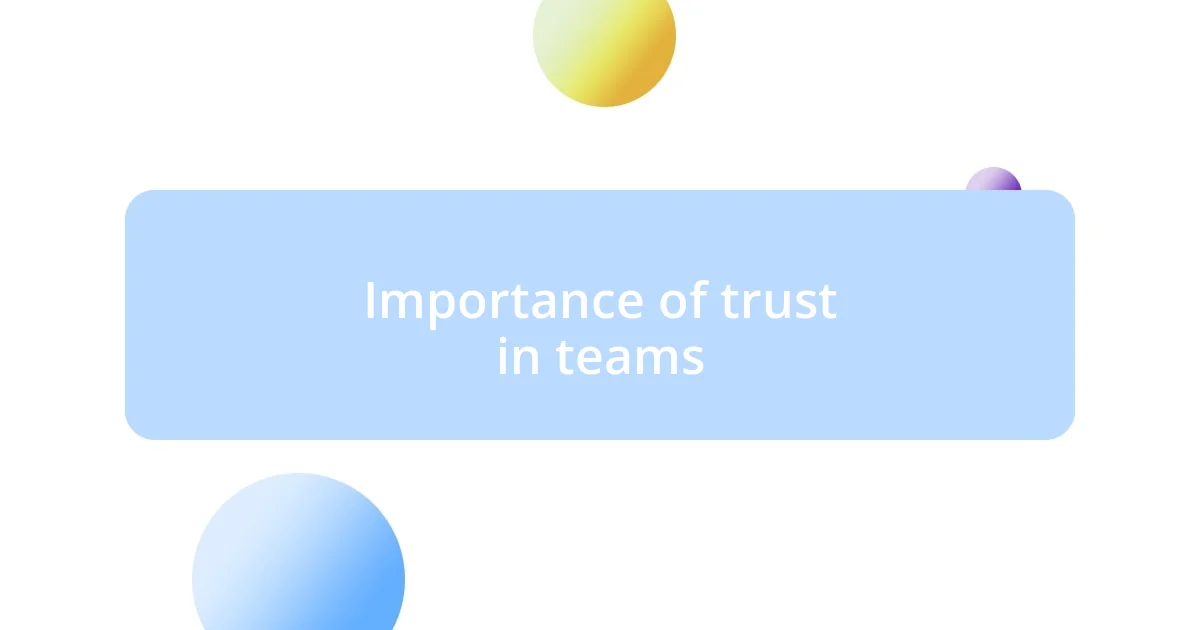
Importance of trust in teams
Team cohesion heavily relies on trust, and its absence can lead to misunderstandings and disengagement. I once found myself on a team where trust was lacking. Decisions were made behind closed doors, and communication was minimal. The frustration was palpable; it felt like I was working in isolation rather than as part of a unit. This experience illuminated for me how trust fosters an open environment, allowing for meaningful collaboration and innovation.
- Improves communication: When trust is established, team members feel safe to share thoughts openly, which enhances dialogue.
- Encourages risk-taking: Knowing that colleagues support one another allows individuals to step out of their comfort zones and propose creative solutions.
- Increases accountability: A trusting environment cultivates a sense of responsibility among teammates, motivating them to follow through on commitments.
- Strengthens relationships: Genuine trust can transform colleagues into friends, which in turn enhances team dynamics and morale.
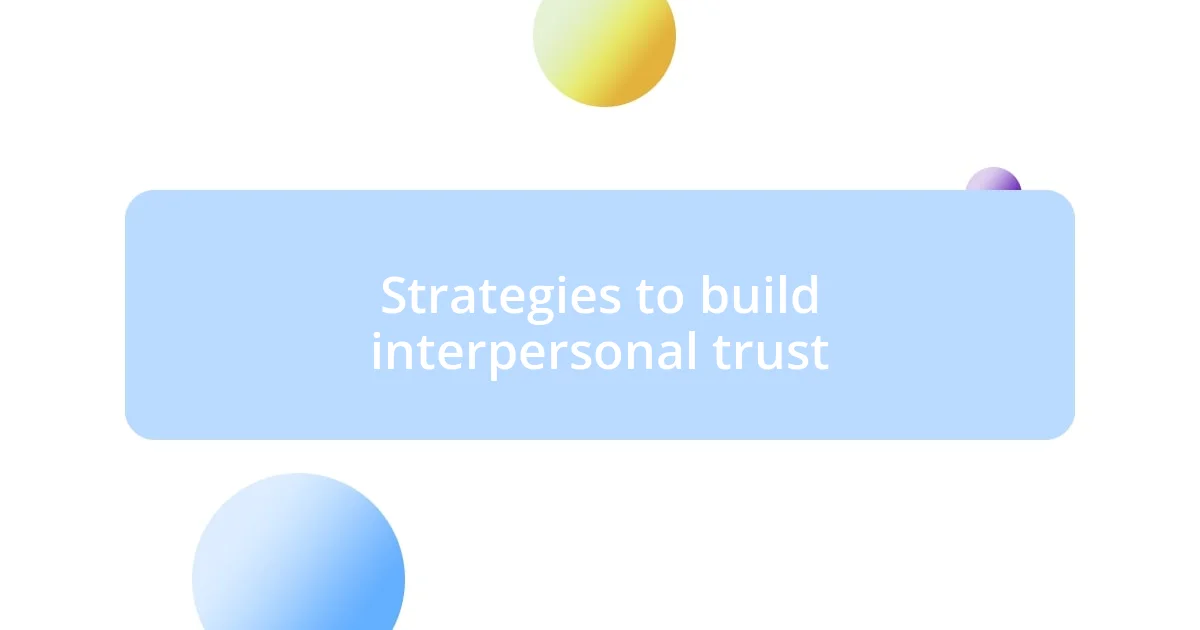
Strategies to build interpersonal trust
Building trust among teammates requires deliberate strategies that foster a supportive environment. One effective approach is to encourage open communication. I remember during a team retreat, we introduced a ‘no holds barred’ session where everyone could voice concerns or ideas without judgment. This vulnerability brought us closer together. It taught me that sharing burdens and triumphs alike creates a deeper understanding and connection among team members.
Another strategy is to establish shared goals. When everyone is aligned towards the same objectives, it cultivates a sense of unity. In one project, we set a clear vision together, breaking it down into manageable tasks. The sense of purpose that emerged made it easier to rely on one another. When challenges arose, knowing that we were all in it together made the tough times feel lighter. Have you experienced a similar shift in team dynamics when everyone works towards a common goal?
Lastly, recognizing and celebrating achievements is crucial. I started a tradition in my team where we acknowledge individual contributions during our meetings. This practice not only boosts morale but reinforces the message that every effort matters. By appreciating one another, we create an environment filled with gratitude and respect—key ingredients in building lasting trust.
| Strategy | Impact |
|---|---|
| Open Communication | Fosters vulnerability and understanding among team members. |
| Shared Goals | Enhances unity and collaboration, making challenges easier to face. |
| Recognizing Achievements | Boosts morale and reinforces respect within the team. |
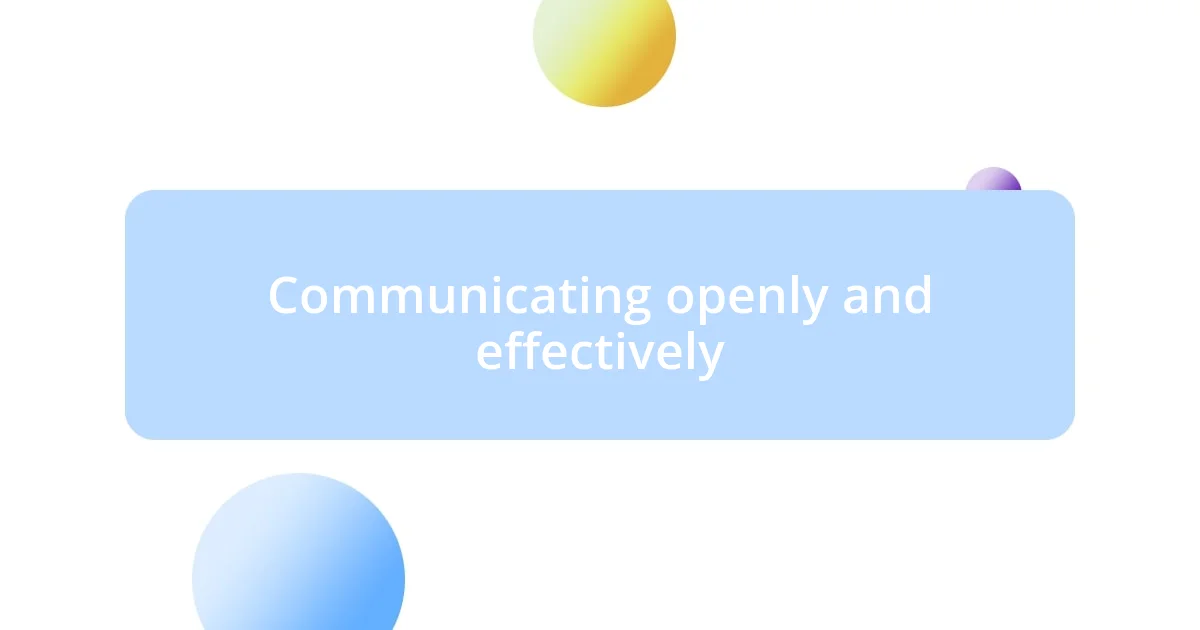
Communicating openly and effectively
When I think about open communication, I remember a time when I decided to share my thoughts on a project that was causing friction in our team. Instead of holding back, I spoke openly about my concerns during a team meeting. The response was surprising—instead of defensiveness, my teammates were relieved. It opened the floodgates of dialogue, and ideas flowed freely. This moment proved that when we voice our thoughts candidly, we create a safe space for others to do the same. Have you ever noticed how transparency can shift the energy of a discussion?
Effective communication also means being present and actively listening. I recall a challenging situation where a teammate was visibly struggling with their workload. While others brushed it off, I took a moment to check in. Just asking, “Is there anything I can help with?” transformed our relationship. They opened up about their challenges, and we brainstormed solutions together. This simple act of listening not only strengthened our bond but also made us both feel more supported. Have you ever felt the weight lifted off your shoulders just by having someone truly listen?
One essential aspect of open communication is being vulnerable with your team. I made it a habit to share not just my successes but also my failures. Not long ago, I admitted to missing a deadline because of poor time management. Rather than feeling embarrassed, I found my teammates reciprocated with their own stories of struggle. This honesty created a profound trust, making it clear that we could lean on one another during tough times. Isn’t it liberating to realize that authenticity can bolster team relationships?
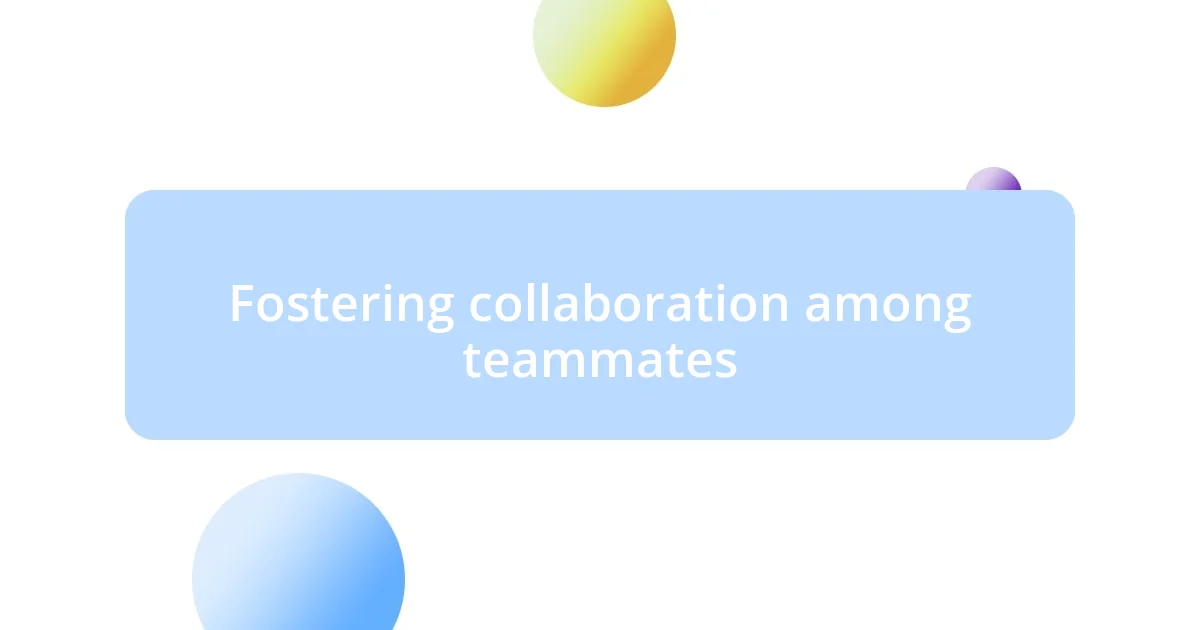
Fostering collaboration among teammates
Collaboration thrives in environments where teammates feel comfortable sharing their ideas. I once initiated a weekly brainstorming session where everyone could contribute without any filters. I was pleasantly surprised how much creativity came forth when people knew their input was valued. Have you ever seen a team light up when they realize their voices truly matter?
Understanding each teammate’s strengths can significantly enhance collaboration. In one project, I took the time to learn about my colleagues’ skills and passions. By aligning tasks with their expertise, I noticed not only an increase in productivity but also a boost in morale. It’s remarkable how much easier collaboration becomes when everyone is playing to their strengths—hasn’t that made your work experience more enjoyable as well?
Building trust also means encouraging a culture of feedback. I’ve made it a point to regularly ask for constructive input on my contributions. This practice often leads to enlightening conversations that strengthen our relationships. When we embrace feedback as a tool for growth rather than criticism, it creates a powerful bond among teammates. Have you experienced that transformative moment when feedback draws you closer together instead of pushing you apart?
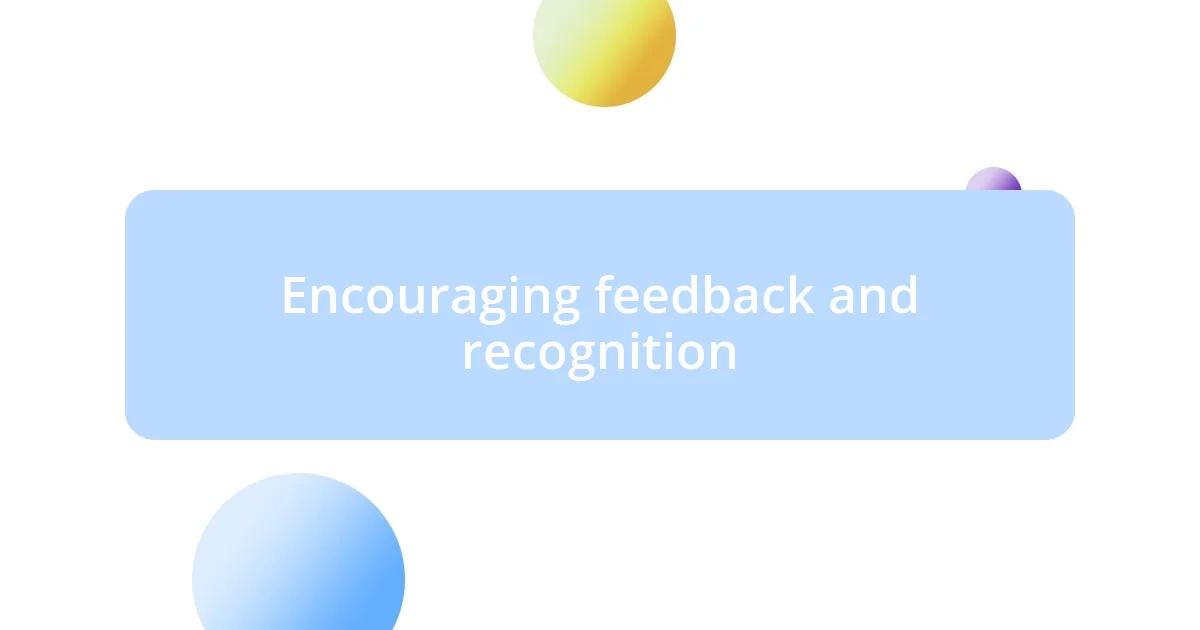
Encouraging feedback and recognition
Encouraging feedback is more than just a process; it’s about embracing vulnerability and openness. I remember when we implemented an anonymous feedback system during one of our projects. The first few comments were a bit tough to swallow, but what struck me was how quickly the team rallied around the initiative. Conversations that once felt stilted became flowing discussions, proving that constructive feedback isn’t about pointing fingers but about lifting each other up. Isn’t it enlightening to witness how feedback can transform the dynamics of a team?
Recognition plays a crucial role in reinforcing positive behaviors and team cohesion. I discovered this firsthand when I made it a point to celebrate small wins during our weekly check-ins. Once, I highlighted a teammate’s innovative approach that significantly improved our workflow. The atmosphere shifted dramatically, as that simple acknowledgment ignited a wave of enthusiasm and motivation throughout the group. It made me realize how much we thrive on appreciation—have you ever felt that rush of joy when someone recognizes your effort?
Moreover, I’ve found that encouraging peer-to-peer recognition builds an even stronger sense of community. I initiated a practice where teammates could “shout out” each other’s contributions during our team huddles. The first time we did this, I was amazed by how even the smallest gestures received heartfelt recognition. It not only nurtured a culture of support, but it also deepened relationships among us. Have you noticed how empowering it can be to publicly acknowledge someone’s hard work? It’s these little moments of gratitude that resonate and build an unbreakable bond within the team.
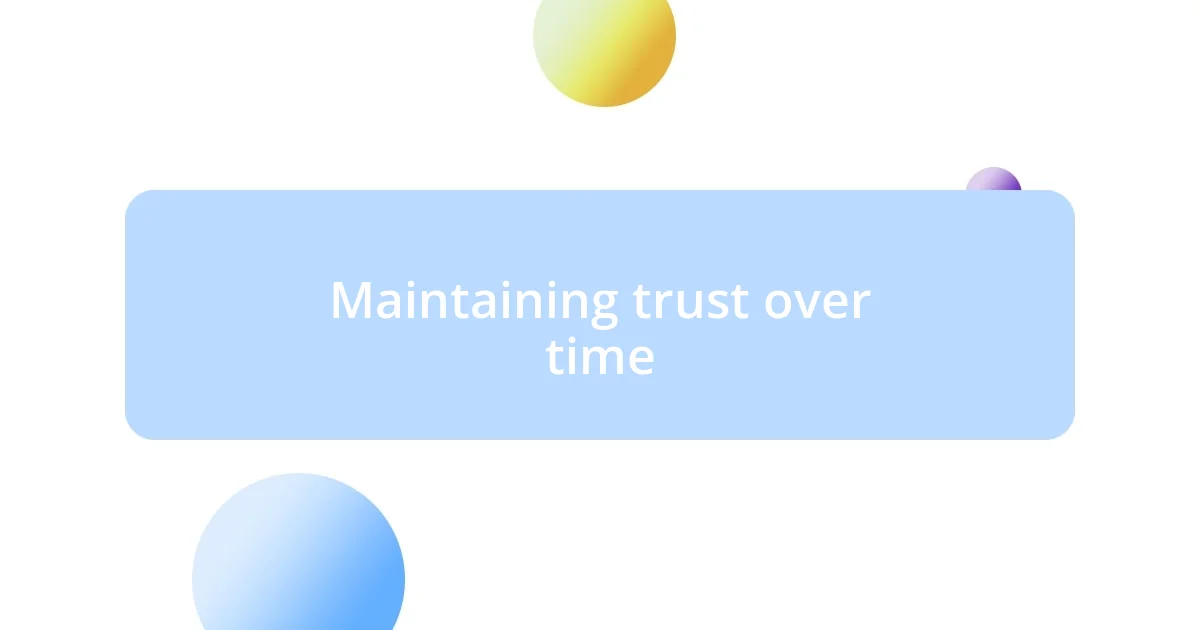
Maintaining trust over time
Maintaining trust over time requires intentional and consistent effort. I vividly recall a moment when our team faced a challenging deadline, and tensions began to rise. Instead of avoiding the situation, I initiated an open discussion where we could express our concerns and frustrations. The vulnerability exhibited during that meeting not only eased the stress but also reinforced our commitment to each other. Have you ever felt the relief that comes when a team can be honest about their struggles?
One key aspect of sustaining trust is recognizing that it can be fragile. I once overlooked a colleague’s input during a decision-making process, thinking I was acting decisively. The moment I realized that my choice undermined their contribution, I quickly initiated a follow-up conversation to apologize and clarify my intentions. This experience taught me that trust must be nurtured and protected, much like a delicate plant. Do you ever consider the impact of seemingly small decisions on your relationships at work?
Lastly, I’ve learned that trust deepens through shared experiences, both good and bad. After a significant project, our team participated in a weekend retreat to unwind and strengthen our bonds. The laughter and stories exchanged on that retreat turned casual colleagues into true friends. Trust flourishes when we create meaningful connections and memories together. Have you found that some of your strongest relationships were built outside the confines of the office?












